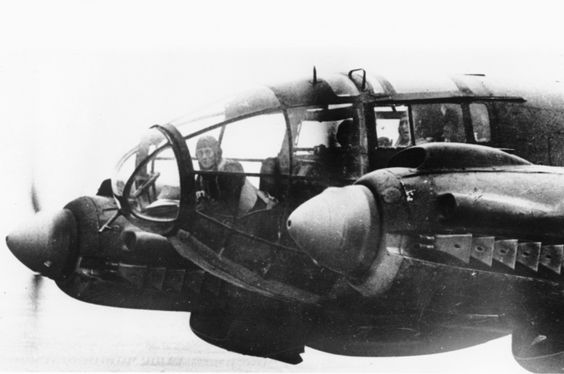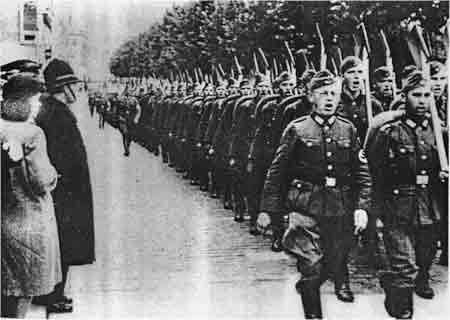Friday 9 August 1940
 |
| Adolf Galland points out a target during a pre-sortie briefing (Einsatzbesprechung). The man second, from the right of the photo, is Oblt. Gerhard Schöpfel, Staffelkapitän of 9./JG 26. August 1940. |
A lone raider bombs the Sunderland shipyard at 11:40. RAF No.79 Squadron intercepts and shoots it down shortly thereafter. While lone bombing runs sound benign, they can be quite deadly: this one kills four people and injures 78. The bomber causes extensive damage not only to the shipyard but also to a railway bridge, a hotel, and several houses.
Another lone raider attacks Flamborough Head and also is shot down, this time by effective anti-aircraft fire.
A lone raider bombs Erdington, beginning the "Birmingham Blitz."
Liverpool districts Prenton and Wirral are bombed for the first time.
A pair of Bf 109s, apparently with bored pilots looking for a thrill, strafe Dover Harbour late in the afternoon. Nothing comes of it, and the fighters are shooed away by the RAF.
The RAF's recent spate of accidents and miscues, almost certainly due in large part to the strains of the conflict, continues. A Hurricane of RAF No. 605 Squadron has some sort of engine trouble and crashes off Dunbar, killing pilot Sgt. R. Ritchie. Later, a Blenheim bomber of RAF No. 600 Squadron is operating near the coast when British Flak units open up on it as well as a nearby Bf 109, sending it down. The two crew both survive, and 8,/JG 2 takes credit for the "kill."
During the night, the Luftwaffe (KG 26) attacks Northumberland port and railway facilities, causing 73 casualties. Another attack on Filton Airfield near Brighton around midnight involves some leaflet dropping as well as bombs.
The Luftwaffe has begun using Guernsey Island airfield in the Channel Islands, so RAF Bomber Command raids Guernsey airfield. It is the first raid on the Channel Islands since the Luftwaffe raid at the end of June, and it sets airfield buildings ablaze but does not interfere with operations. Friederich Schumacher becomes the new German administrator of the islands.
RAF raids take place on Poulmic (Brest), Flushing oil works, Ludwigshafen and Cologne.
Overall, it is a fairly uneventful day, which is probably quite welcome to both sides after the wild events of 8 August. Both sides lose 4 or 5 planes.
 |
| Adolf Galland's Bf 109 during August 1940. If you look closely, you can see 22 victory marks on the rudder. |
Convoys OA 196 and MT 135 depart from Methil, Convoy FN 247 departs from Southend, Convoy FS 247 departs from the Tyne.
British corvette HMS Erica (K 50, Lt. Commander William C. Riley) is commissioned.
Battle of the Mediterranean: There are no air raid alerts on Malta during the day. Governor-General Dobbie reports that ammunition stocks are running low and that supply estimates must be raised by 50% from pre-war estimates. He needs ammunition, and fast.
The RAF raids Tobruk.
British Somaliland: Italian fighters raid Berbera. South African Air Force planes bomb Italian positions at Neghelli airfield in Abyssinia. Italian land forces are approaching the British positions around Berbera cautiously.
Romanian/Bulgarian Relations: Bowing to German pressure, Romania agrees to cede Southern Dobruja (Dobrogea de sud) to Bulgaria, with the 100,000 population to be re-located within Romania. The official agreement is not yet signed.
 |
| A Heinkel He 111 over the English Channel during the Battle of Britain. |
Cudahy has strongly hinted that humanitarian assistance should be allowed through the blockade. The British take special umbrage to this. No doubt due to British complaints, Acting Secretary of State Sumner Welles reads a formal statement to a press event which states that Cudahy's comments "are not to be construed as representing the views of this government" and that the incident:
illustrates once again the importance which must be attributed by American representatives abroad to the Department's instructions to refrain at this critical time from making public statements other than those made in accordance with instructions of the Department of State.Interestingly, the statement does not say that Cudahy is wrong or mistaken, just that he has spoken out of turn. What Cudahy has said in fact is true, but it not "politically correct."
German Military: The first directive for the invasion of the Soviet Union in 1941, now code-named "Otto," is issued. Colonel-General Alfred Jodl issues the Aufbau Ost ("Reconstruction East") directive which requires preliminary infrastructure improvements in the eastern section of Germany and occupied Poland to facilitate an invasion of the Soviet Union.
US Military: US heavy cruisers USS Wichita and Quincy make port at Pernambuco, Brazil during their "Show the Flag" mission to Latin America. Meanwhile, destroyers USS Wake and Wainwright depart Santos, Brazil for Rio de Janeiro, and gunboat USS Erie leaves the Panama Canal Zone for Ecuador on the same mission.
Bill Donovan briefs President Roosevelt and US Secretary of the Navy Frank Knox on his findings in Europe.
Holocaust: A special income tax surcharge of 15% is imposed on Polish citizens living in the Reich for the costs of the German occupation of Poland.
Free France: Charles de Gaulle announces that he has the support of French in New Hebrides.
Albania: There is a local rebellion in the north of Italian-occupied Albania. Troops are sent to "pacify" the region by burning down villages.
China: The British decide to pull back around Shanghai and Tientsin province to avoid further tensions with Japan. The troops are "needed elsewhere."
British Homefront: German radio, which is widely listened to in Great Britain (broadcasting in perfect English), continues to stoke fear and panic. They announce, for instance, that swarms of parachutists are standing by to drop in England wearing British uniforms.
August 1940
August 1, 1940: Two RN Subs Lost
August 2, 1940: Operation Hurry
August 3, 1940: Italians Attack British Somaliland
August 4, 1940: Dueling Legends in the US
August 5, 1940: First Plan for Barbarossa
August 6, 1940: Wipe Out The RAF
August 7, 1940: Burning Oil Plants
August 8, 1940: True Start of Battle of Britain
August 9, 1940: Aufbau Ost
August 10, 1940: Romania Clamps Down On Jews
August 11, 1940: Huge Aerial Losses
August 12, 1940: Attacks on Radar
August 13, 1940: Adler Tag
August 14, 1940: Sir Henry's Mission
August 15, 1940: Luftwaffe's Black Thursday
August 16, 1940: Wolfpack Time
August 17, 1940: Blockade of Britain
August 18, 1940: The Hardest Day
August 19, 1940: Enter The Zero
August 20, 1940: So Much Owed By So Many
August 21, 1940: Anglo Saxon Incident
August 22, 1940: Hellfire Corner
August 23, 1940: Seaplanes Attack
August 24, 1940: Slippery Slope
August 25, 1940: RAF Bombs Berlin
August 26, 1940: Troops Moved for Barbarossa
August 27, 1940: Air Base in Iceland
August 28, 1940: Call Me Meyer
August 29, 1940: Schepke's Big Day
August 30, 1940: RAF's Bad Day
August 31, 1940: Texel Disaster
2020

No comments:
Post a Comment